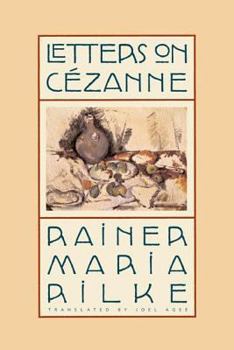Letters on Cézanne
Select Format
Select Condition 
Book Overview
Rilke's prayerful responses to the french master's beseeching art "For a long time nothing, and then suddenly one has the right eyes." Virtually every day in the fall of 1907, Rainer Maria Rilke... This description may be from another edition of this product.
Format:Paperback
Language:English
ISBN:086547639X
ISBN13:9780865476394
Release Date:September 2002
Publisher:North Point Press
Length:112 Pages
Weight:0.28 lbs.
Dimensions:0.3" x 5.4" x 8.0"
Customer Reviews
2 ratings
How to create in seeing as poet and artist
Published by Thriftbooks.com User , 19 years ago
Rilke understands Cezanne as one ' who lived in the innermost center of his work for forty years'. The old man who he describes being thrown stones at by children on his way to his studio where he worked and worked, and only worked from the time he found his vocation at the age of thirty, is the example to Rilke of the totally dedicated artist. This artist has that kind of patience which slowly lets his work enfold, layer upon layer. In this as always with Rilke remarkably beautiful and haunting collection of letters he tells of his encounter with the work of Cezanne and how the true artist brings into fuller being the object he sees and creates. Rilke is quoted in the introduction as he talks of " the scales of an infinitely responsive conscience.. which so incorruptibly reduced a reality to its color content that that reality resumed a new existence in a beyond of color, without any previous memories". This statement so suggestive is typical of the Rilkean text which seems like poetry itself to offer more meanings than any single reading can grasp. My brief remarks comment upon a few of those suggestions. I believe readers of this work will be inspired to seeing , reading, and in their own minds through the reading, creating of their own on a higher level.
Letters about the spirituality of art
Published by Thriftbooks.com User , 23 years ago
The encounter with the work of Cezanne was one of the milestones in the life of the poet Rilke. The letters which are collected here show why. Rilke, like Cezanne, was a man who was religious in an unconventional way. He was not interested in any particular concept of God, but in the process of discerning the divine in the sheer existence of things as they are: "All talk is misunderstanding. Insight is just in work." What he admired most in Cezanne's work was his "devout objectivity", the ability to let objects speak for themselves without the intellectual interference by the artist and without preconceived notions. Rilke felt that when Cezanne painted the mountain Sainte Victoire, for example, he wanted to show the essence of the mountain, the mountain pure and simple, nothing more, nothing less.The German edition of the Letters on Cezanne contains an excellent afterword which quotes the philosopher Martin Heidegger who wrote, "we come too late for the Gods, and too early for being," meaning we do not live in the safety of believing in the Gods any more, and we do not trust in simply being yet. Rilke was acutely aware of this state of suspension, and the collection of his letters on Cezanne gives us an idea of how Rilke as an artist intended to make sense of this life in suspension.





